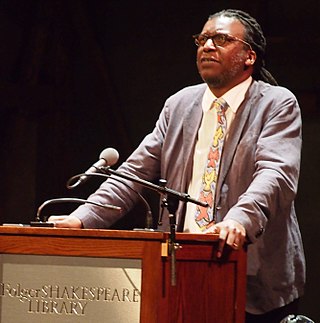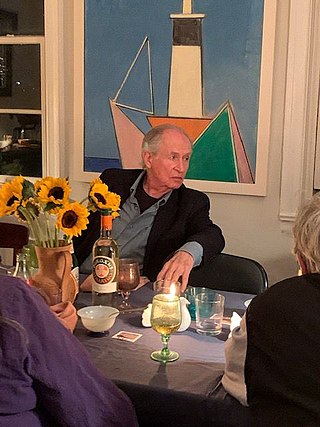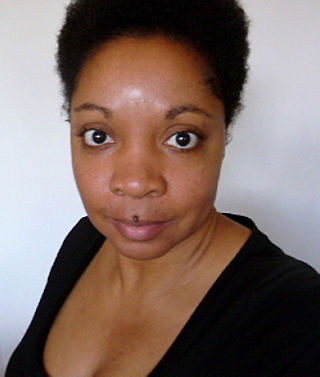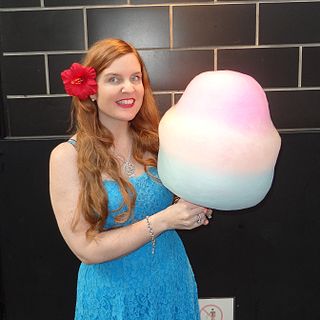Related Research Articles

Prose poetry is poetry written in prose form instead of verse form while otherwise deferring to poetic devices to make meaning.

Stephen Elliot Dunn was an American poet and educator who authored twenty-one collections of poetry. He won the Pulitzer Prize for Poetry for his 2000 collection, Different Hours, and received an Academy Award in Literature from the American Academy of Arts and Letters. He also won three National Endowment for the Arts Creative Writing Fellowships, Guggenheim Fellowship, and Rockefeller Foundations Fellowship.
Franz Wright was an American poet. He and his father James Wright are the only parent/child pair to have won the Pulitzer Prize in the same category.
Marvin Hartley Bell was an American poet and teacher who was the first Poet Laureate of the state of Iowa.

Cornelius Eady is an American writer focusing largely on matters of race and society. His poetry often centers on jazz and blues, family life, violence, and societal problems stemming from questions of race and class. His poetry is often praised for its simple and approachable language.

X. J. Kennedy is an American poet, translator, anthologist, editor, and author of children's literature and textbooks on English literature and poetry. He was long known as Joe Kennedy; but, wishing to distinguish himself from Joseph P. Kennedy, he added an "X" as his first initial.
Mary Ruefle is an American poet, essayist, and professor. She has published many collections of poetry, the most recent of which, Dunce, was longlisted for the National Book Award in Poetry and a finalist for the 2020 Pulitzer Prize. Ruefle's debut collection of prose, The Most Of It, appeared in 2008 and her collected lectures, Madness, Rack, and Honey, in 2012, both published by Wave Books. She has also published a book of erasures, A Little White Shadow (2006).
Gillian Conoley is an American poet. Conoley serves as a professor and poet-in-residence at Sonoma State University.

Carolyn Ashley Kizer was an American poet of the Pacific Northwest whose works reflect her feminism. She won the Pulitzer Prize in 1985.

John Skoyles is an American poet and writer.
Fleda Brown is an American poet and author. She is also known as Fleda Brown Jackson.
Jeff Oaks was an American poet and essayist who was a senior lecturer at the University of Pittsburgh, and the assistant director of the writing program.

Wesley McNair is an American poet, writer, editor, and professor. He has authored eleven volumes of poetry, most recently, Late Wonders: New & Selected Poems and Dwellers in the House of the Lord. He has also written three books of prose, including a memoir, The Words I Chose: A Memoir of Family and Poetry. In addition, he has edited several anthologies of Maine writing, and served as a guest editor in poetry for the 2010 Pushcart Prize Annual.

Allison Joseph is an American poet, editor and professor. She is author of eight full-length poetry collections, most recently, Confessions of a Bare-Faced Woman.
Eve Shelnutt was an American poet and writer of short stories. She lived in Kalamazoo, Michigan, Pittsburgh, Pennsylvania, Athens, Ohio, and Worcester, Massachusetts. Over the course of her career, she taught at Western Michigan University University of Pittsburgh, Ohio University, and The College of the Holy Cross.

Dzvinia Orlowsky is a Ukrainian American poet, translator, editor, and teacher. She was born in Cambridge, Ohio and received her BA from Oberlin College and her MFA from the Warren Wilson College MFA Program for Writers. She is author of seven poetry collections published by Carnegie Mellon University Press including Convertible Night, Flurry of Stones for which she received a New England Poetry Club's Sheila Motton Book Award, and Silvertone (2013) for which she was named Ohio Poetry Day Association's 2014 Co-Poet of the Year. Her first collection, A Handful of Bees, was reprinted in 2009 as a Carnegie Mellon University Classic Contemporary. Her sixth, Bad Harvest, was published in fall of 2018 and was named a 2019 Massachusetts Book Awards “Must Read” in Poetry. Her most recent collection, Those Absences Now Closest, was published in October, 2024.
Dave Smith is an American poet, writer, critic, editor, and educator.

Vasyl Makhno is a Ukrainian poet, essayist, and translator. He is the author of nine collections of poetry, including Winter Letters and Other Poems, translated by Orest Popovych and, most recently, I want to be Jazz and Rock’n’Roll. He has also published two books of essays, The Gertrude Stein Memorial Cultural and Recreation Park (2006) and Horn of Plenty (2011). Makhno has translated Zbigniew Herbert’s and Janusz Szuber’s poetry from Polish into Ukrainian. His poems and essays have been translated into 25 languages, and he is the 2013 recipient of Serbia’s Povele Morave Prize in Poetry. Makhno currently lives in New York City.

Cassandra Atherton is an Australian prose-poet, critic, and scholar. She is an expert on prose poetry, contemporary public intellectuals in academia, and poets as public intellectuals, especially hibakusha poets. She is married to historian Glenn Moore.
Bridget Lowe is an American poet.
References
- 1 2 3 Chrusciel, Ewa. "Review of Jeff Friedman's Pretenders," Poetry International, November 12, 2014.
- 1 2 3 4 5 6 7 Smith, Nicola. "Images of Food and Family," Valley News, March 18, 2011.
- 1 2 3 4 Doreski, William. "Jeff Friedman: Taking Down the Angel," Valparaiso Poetry Review, 2003. Retrieved December 17, 2022.
- 1 2 3 4 Mitchell, Nancy. "Jeff Friedman interviewed by Nancy Mitchell," Plume, April 2019. Retrieved December 17, 2022.
- 1 2 3 4 Biello, Peter. "The Bookshelf: Poet (and 'Comedian') Jeff Friedman," New Hampshire Public Radio, September 29, 2017. Retrieved December 17, 2022.
- 1 2 Bargen, Walter. "Floating Tales by Jeff Friedman," Poetry International, Issue 27/28, 2017. Retrieved December 16, 2022.
- 1 2 3 Makuck, Peter. Review. Hudson Review, 2007, p. 492–93.
- 1 2 3 Bland, Celia. "Working in Flour," Poetry International, 2011, p. 662.
- 1 2 3 4 Bargen, Walter. "Context with a Twist," New Letters, Spring & Summer 2014, p. 191–93.
- 1 2 3 4 5 Bland, Celia. "Book Review: The House of Grana Padano," 100-Word Story, October 14, 2022. Retrieved December 16, 2022.
- 1 2 Poetry Foundation. Jeff Friedman, Poets. Retrieved December 16, 2022.
- 1 2 3 MacDowell. Jeff Friedman, Artists. Retrieved December 16, 2022.
- ↑ Friedman, Jeff. "Mannikins" and "The Record-Breaking Heat Wave," Poetry, September 1980.
- ↑ Friedman, Jeff. "Gnats," The Missouri Review, Fall 1983.
- ↑ Friedman, Jeff. "Wiredraw," "Martha Manning Dress Factory, 1963," Ironwood, Spring 1985.
- 1 2 3 4 5 New Hampshire State Council on the Arts. "New Hampshire Poet Showcase," Arts & Artists. Retrieved December 16, 2022.
- ↑ Arzate, Ben. "Best Microfiction 2021 Proves The Value Of Keeping It Short," Cultured Vampires, July 12, 2021. Retrieved December 16, 2022.
- ↑ Pokrass, Meg, Gary Fincke and Tania Hershman (eds). Best Microfiction 2022, Claremont, CA: Pelekinesis, 2022. Retrieved December 16, 2022.
- ↑ Johnson, Peter (ed). A Cast-Iron Aeroplane That Can Actually Fly: Commentaries from 80 Contemporary American Poets on their Prose Poetry, Cheshire, MA: MadHat Press, 2019. Retrieved December 16, 2022.
- ↑ Atherton, Cassandra and Peter Johnson. Dreaming Awake: New Contemporary Prose Poetry from the United States, Australia, and the United Kingdom, Cheshire, MA: MadHat Press, 2023.
- 1 2 Ashworth, D. J. "To Passionate Revelations," Anemone, Fall 1987.
- 1 2 Hastings, Josey. "Friedman's Poetry Leaves Lasting Images," Randolph Herald, May 21, 1998.
- 1 2 3 Bargen, Walter. "Taking Down the Angel (review)," The Missouri Review, Vol. 26, Number 1, 2003, p. 176–78. Retrieved December 16, 2022.
- ↑ Mayo, Tim. "The Gorgeous Passion of Symbolism Regained; Book Review of Mieczyslaw Jastrun’s Memorials," Poetry International, February 23, 2015.
- 1 2 Doreski, William. "Interview with Poet/Translators Dzvinia Orlowsky and Jeff Friedman," Solstice, Spring 2016. Retrieved December 17, 2022.
- ↑ Keene State College. "Jeff Friedman Earns First KSC Adjunct Excellence in Teaching Award," News. October 1, 2015. Retrieved December 16, 2022.
- 1 2 Rule, Rebecca. "Friedman stitches poignant scenes with 'black threads,'" Concord Monitor, March 18, 2007, p. D5.
- 1 2 Bland, Celia. "Jeff Friedman: Black Threads," Valparaiso Poetry Review, 2007. Retrieved December 17, 2022.
- ↑ Beschta, James. Review, Kliatt, 2003.
- 1 2 Hetherington, Paul and Cassandra Atherton. Prose Poetry: An Introduction, Princeton University Press, 2020, p. 112–13. Retrieved December 17, 2022.
- 1 2 3 Aguero, Kathleen. "Pretenders by Jeff Friedman," Solstice Literary Journal, 2014. Retrieved December 16, 2022.
- ↑ Friedman, Jeff. "Judges" and Commentary, in [A Cast-Iron Aeroplane That Can Actually Fly: Commentaries from 80 Contemporary American Poets on their Prose Poetry], Cheshire, MA: MadHat Press, 2019. Retrieved December 16, 2022.
- 1 2 3 Rule, Rebecca. "It ain't over till the last stanza," Concord Monitor, February 2, 2003, p. D4.
- ↑ Willis, Irene. "Black Threads," Alehouse Review, 2011, p. 94–96.
- ↑ Doreski, William. "Black Threads," Home Planet News, 2007, p. 9, 22.
- ↑ Schoeneman, Deborah. "Working in Flour Jeff Friedman," Jewish Book World, September 1, 2011. Retrieved December 17, 2022.
- 1 2 3 Lawless, Daniel. "Introduction," in Floating Tales by Jeff Friedman, Asheville, NC: Plume Editions/Madhat Press, 2017. Retrieved December 16, 2022.
- 1 2 Whittenburg, Alice. "Reading at The Irreal Cafe: Floating Tales by Jeff Friedman," The Irreal Café, April 2, 2018. Retrieved December 16, 2022.
- ↑ Rammelkamp, Charles. "Meg Pokrass and Jeff Friedman’s The House of Grana Padano," The Loch Raven Review, Vol. 18, #1, 2022. Retrieved December 16, 2022.